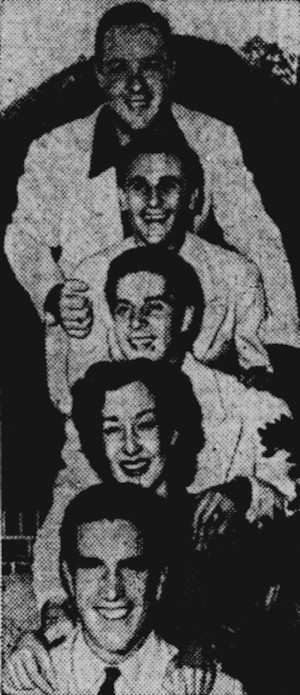The Bob-o-links

The Bob-o-links with Bob Crosby. From top to bottom: Crosby, Tony Paris, Johnny Desmond, Ruth Reddington, and Ed Lavine.
-
Known Members
Johnny Desmond
Ed Lavine
Tony Paris
Ruth Reddington
-
Orchestras
Bob Crosby
Following the success of Tommy Dorsey’s Pied Pipers, vocal groups became all the rage in the early 1940s. Other bandleaders soon sought to cash in on the trend, and among them was Bob Crosby. While performing in Detroit during mid-1940, Crosby and band manager Gil Rodin heard a vocal quartet called the Downbeaters on radio station WWJ and promptly hired them, changing their name to the Bob-o-links. Composed of three men and one woman, the Bob-o-links are best remembered today, if at all, for singer Johnny Desmond, who got his start in the quartet. Other members were Tony Paris, Ed Lavine, and Ruth Reddington.
Though an early report suggested that audiences raved about the four young singers, music journalists were not impressed. Reviews of the group were often harsh and sometimes hostile, especially from Down Beat magazine staff. Down Beat writer Dave Dexter Jr. once complained that they “clammed up many an arrangement with their trite and unrefreshing vocals.” In a review of one new Crosby record, Dexter’s first words were: “No Bob-o-Links! The absence of that vocal quartet’s name on the labels is enough to make anyone hear the actual performances.”[1] In another review of the recording “Far Away Music,” Dexter said it “might have been better had the Bob-o-Links been farther away.”
In an April 1941 Down Beat article reviewing the terrible Crosby band film Let’s Make Music, John Henry Aegis lamented the fact that advertising had promised the band’s Bob Cats Dixieland unit “but the Bobcats turned out to be four things called the Bob-o-links.” This prompted Bob-o-link member Paris to write an angry letter to the magazine’s editor.
I ran across a line calling myself and my colleagues “4 things.” I thought I’d let you know that we consider it an insult and the first chance I get, personally, I’m going to make Aegis retract that statement.
I don’t think there is any other quartet that tries or works any harder than we do, and we take all the bad criticism with the good. But when a man in his position publicly insults us, that’s too much.
The Bob-o-links never overcame their detractors. They were gone by July 1941. In noting their departure, Down Beat writer George Frazier said “I don’t honestly think anyone will be gravely disappointed.”
Desmond quickly found work with Gene Krupa, where he remained until mid-1942 when he became caught in the draft. He spent part of his service tour as vocalist for Glenn Miller’s Army Air Force Band and after the war began a successful solo career. Paris initially remained with Crosby as the band’s assistant manager and in 1942 was part of the vocal combo Six Hits and a Miss and the vocal quartet the Mellowaires.
Crosby resurrected the name Bob-o-links from time to time over the years.
Notes
Various capitalizations of the name Bob-o-links appeared in the press. “Bob-o-links,” used on Decca record labels, seems to have been the official version. ↩︎
Sources
- Kay, Eunice. “Crosby Band Adds a Vocal Quartet.” Down Beat 15 Aug. 1940: 21.
- “Bob-O-Links.” Lawrence Daily Journal-World [Lawrence, Kansas] 31 Mar. 1941: 8.
- Aegis, John Henry. “Hollywood Is Jazz' Deadliest Enemy.” Down Beat 15 Apr. 1941: 13.
- Paris, Tony. “A Bob-O-Link Resents Being Called a 'Thing.'” Down Beat 15 May 1941: 11.
- Dexter, Dave, Jr. “Reviewer Blows Top after Digging Jim Dorsey Wax.” Down Beat 15 May 1941: 14.
- Warner, Eve M. “Vaudeville Reviews: 20th Century, Buffalo.” Billboard 24 May 1941: 22.
- Dexter, Dave, Jr. “20 Inches of Shaw Blues Pace New Record Output.” Down Beat 15 Jun. 1941: 14.
- Frazier, George. “Crosby Band 'My Pet, But Dissipates Talent.'” Down Beat 15 Aug. 1941: 8.
- “D'Amico out as Crosby Band Lands Ale Show.” Down Beat 15 Sep. 1941: 4.
- “Bob-O-Link Desmond Joins Krupa.” Down Beat 15 Sep. 1941: 4.
- Dexter, Dave, Jr. “Crosby Band Great on Air, But Records Disappoint.” Down Beat 1 Nov. 1941: 14.
- Holly, Hal. “Los Angeles Band Briefs.” Down Beat 1 May 1942: 12.